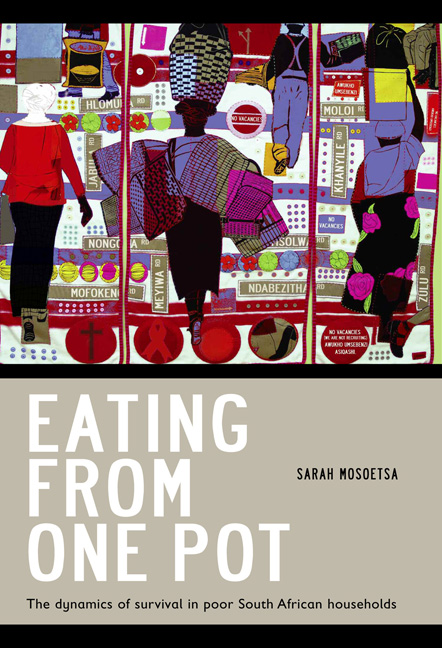Book contents
- Frontmatter
- Contents
- Foreword
- Acknowledgements
- Introduction
- Chapter 1 ‘Sharing the little I have with my family’: the allocative rules of household resources and income
- Chapter 2 ‘My wife does not respect me anymore’: unequal power dynamics in households
- Chapter 3 ‘I remain an ANC member, but …’: civil society in Mpumalanga and Enhlalakahle
- Chapter 4 Theoretical and Policy Implications
- Conclusion: Poor households are fragile sites of stability
- Selected Bibliography
- Index
Chapter 2 - ‘My wife does not respect me anymore’: unequal power dynamics in households
Published online by Cambridge University Press: 20 April 2018
- Frontmatter
- Contents
- Foreword
- Acknowledgements
- Introduction
- Chapter 1 ‘Sharing the little I have with my family’: the allocative rules of household resources and income
- Chapter 2 ‘My wife does not respect me anymore’: unequal power dynamics in households
- Chapter 3 ‘I remain an ANC member, but …’: civil society in Mpumalanga and Enhlalakahle
- Chapter 4 Theoretical and Policy Implications
- Conclusion: Poor households are fragile sites of stability
- Selected Bibliography
- Index
Summary
Chapter one describes how households expand as they incorporate vulnerable family members and how they have to diversify their economic activities in order to meet the challenge of poverty. This chapter deals with the ways in which poverty and unemployment strain household resources and relations. While the household is becoming the only sanctuary for the poor and unemployed, its stability is endangered by poverty and unemployment. Resources are scarce and relations in the household are characterised by conflict. Gender and age dynamics feature strongly in these conflicts. The management, sharing and allocation of resources are highly contested matters.
The chapter will also engage with theories that suggest that households are invariably harmonious places in which resources are distributed amicably among their members. Neoclassical theories assert that households consist of individuals who are either consumers or workers. These theories tend to reject the notion of household collectivity. Gary Becker's ‘new-household economics’ (1965, 1974, 1981), by contrast, rests on the idea of ‘altruistic collectivity’ and ‘welfare maximisation’ in households. Welfare maximisation can be achieved through ‘benevolent dictatorship’ by the household head. Both the neoclassic al and Beckerian approaches have been criticised for treating household relations and dynamics as a ‘black box’ (Kabeer, 1994). Galbraith (1974) argues that neoclassical theory subordinates certain household individuals, particularly women, and disguises the exercise of male authority. Folbre (1994) rejects the notion of a unitary household. She argues that it is not consistent to argue that individuals who are wholly selfish in the market place, as proposed by many economists, would be selfless within the household. She asserts that, in fact, ‘family life is shifting and is a somewhat unpredictable mixture of selfishness and altruism’ (Folbre, 1994:23).
Naila Kabeer (1994:101) argues that the control and allocation of re - sour ce s within the household is ‘a complex process which has to be seen in relation to a web of rights and obligations.’ There are widespread intra-household ‘distributional inequalities and failures.’ This becomes especially apparent when the allocation of labour time between household production and wage employment is taken into account. Women tend to allocate longer hours to the household and fewer hours to wage labour than men do.
- Type
- Chapter
- Information
- Eating from One PotThe dynamics of survival in poor South African households, pp. 57 - 79Publisher: Wits University PressPrint publication year: 2011



